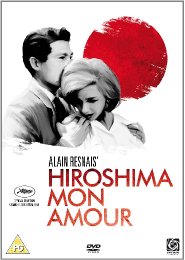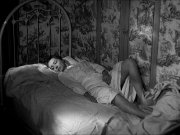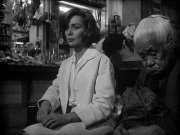Review for Hiroshima Mon Amour
Having recently seen Alan Resnais chilling holocaust documentary, 'Night and Fog', I had thought that 'Hiroshima Mon Amour' might be closer to that in spirit and technique than his dreamlike surrealistic masterpiece, Last Year at Marienbad. I was wrong. Hiroshima Mon Amour is an out and out art film using a thin (though thought provoking) narrative to propel itself slowly towards its conclusion.
The film may be set in 'Hiroshima', and the ghosts of that terrible occurrence are omni-present throughout, but this is essentially an bitter-sweet existential journey into the futility of love. And like you I can't believe I just said that.
A French actress (played highly convincingly by Emmanuelle Riva) is filming a feature film about peace in Japan and whilst on location in Hiroshima she has an affair with a handsome Japanese architect (Eiji Okada). As the couple deepen the intensity of their relationship, the actress recalls her own painful memories of the war where her lover, a German soldier in occupied France, was shot and she was seen as collaborator by her friends and neighbours.
According to Resnais himself, the film started off in the same vein as 'Night and Fog' and was initiated as an anti-nuclear weapon documentary. The powerful opening of the film (juxtaposing every day 'love-making' with records of the horrors wreaked by the bomb on Hiroshima and its inhabitants) can easily be seen in this context. Indeed, one of the film's most memorable images is that of what appears to be the sand -covered limb of a dead victim - until it moves. And we see, as the camera pulls out, that it is two people in an embrace.
But whilst Resnais was happy to pick up most the accolades for one of the most successful art-films in a decade full of them, Marguerite Duras' script must surely take some of the credit as it was written in full before Resnais adopted it.
Much of the film is about the importance of remembering - but also of getting in with life regardless; a real dichotomy for Emmanuelle Riva's character who still feels guilty about her German partner and wonders if her affairs are just a way to try and revive his memory to some degree. Or is the intoxicating escape of sex helping to dull the pain for just a few brief moments of bliss where no other thought or responsibility can pervade?
And what of her partner? He appears to be a bit part player in her life. This film is about her after all. But what does he get out of the relationship? Surely more than merely the escapism of mutually enjoyable sex?
Whatever the case, it remains a thought-provoking piece.
The film is shipped without extras so there is little help in understanding the film. That would have suited Resnais just fine. He doesn't like having to explain anything, believing that an art form should never need explaining. Similarly he was never comfortable being seen as part of the 'French New Wave'.
The picture quality is more than adequate though a little flat in tone on occasions. It's difficult to see if that's a transfer issue or part of the original print. A quick pump of the contrast makes it a more satisfying view.
Whatever the case, it's anarguably a part of cinema history and its good to know it's out there.





















































Your Opinions and Comments
Be the first to post a comment!